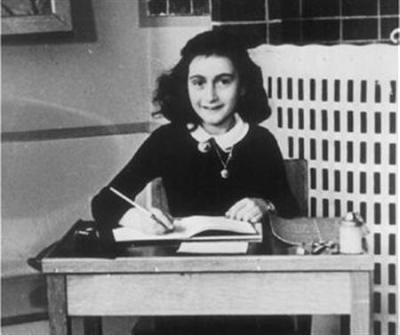Anne Frank's Lost Diary Entries Are About More Than Dirty Jokes

Since they were discovered at the end of World War II, the diaries of Anne Frank have long served as both a fascinating and sober snapshot of one of the most difficult periods of world history.
You'll recall that Anne was just 13 years old and in hiding following the Nazi occupation of the Netherlands when she began chronicling her observations and innermost thoughts from inside a sealed off section of a family friend's business in Amsterdam. Along with seven other people, including a sister and her mother and father, it was there that Anne lived for the next two years. They were discovered in August of 1944 and sent to a Nazi concentration camp. Only Anne's father, Otto, survived.
Historians and students have studied Anne's writings ever since. Earlier this week, news broke that researchers, using new digital technology, have deciphered two previously hidden pages of Anne's red-checkered diary. News accounts suggest they contain "dirty jokes" [you can watch one report here] that had been deliberately covered over (presumably by Anne) with brown masking paper and tape.
That a 13-year-old girl would be curious about human sexuality should surprise no one, of course. Truth be told, the "dirty jokes" are quite tame when compared to some of the graphic references that populate today's news, i.e. the latest White House Correspondents' dinner. So it would be easy to simply note this latest discovery as something of a curiosity, a psychological juvenile dip into sexuality, and move on.

But buried within the newly uncovered material is a statement so straight-forward that it's also quite profound.
Writing about how a young woman enters into puberty around age 14, Anne says this maturation for a teenager is "a sign that she is ripe to have relations with a man but one doesn't do that of course before one is married."
Today, modern sensibilities find this type of moral clarity surrounding sex to be at best old-fashioned and at worst, confining and downright repressive.
But to Anne, waiting to have sex until she was married was completely normal.
"Of course," it was.
Just consider the fact that in 1940 in the U.S., 3.8 percent of women who gave birth were unmarried compared to over 40 percent today. Child-bearing outside of marriage is increasingly common because marriage is increasingly uncommon.
If you've ever been to "The Hiding Place," aka "The Secret Annex," in Amsterdam — the site of Anne's diary writing and home for two years — you'll see a wall adorned with, among other items, pictures of the young girl's favorite Hollywood stars. That tells me she was a perfectly normal teenager who dreamed and fantasized like the typical teenager of her day, sexual curiosities included.
Unfortunately, most of the headlines surrounding this recent discovery are focusing on the "dirty jokes" and not on the young girl's sentiments coupling sex with marriage.
Of course they are.
Sadly, we live in a world obsessed with sex and swim in a culture that increasingly tries to disconnect human sexuality from marital commitment. We do so at our peril.
Ironically, in a previously discovered entry in her diary, a young Anne observes that "Women should be respected ... women, who struggle and suffer pain to ensure the continuation of the human race, make much tougher and more courageous soldiers than all those big-mouthed freedom-fighting heroes put together!"
Anne Frank — a forerunner to the #MeToo movement?
Of course she was.
I think it would have amazed but delighted the teenage Anne Frank to think people all around the world would still be talking 75 years later about her thoughts and words forged and formed in the fire of a world that was at war.
But here we are highlighting a young girl's declaration that echoes the timeless and biblical belief that sex and marriage are to be inextricably linked.
Did she really believe it?
Of course.




























